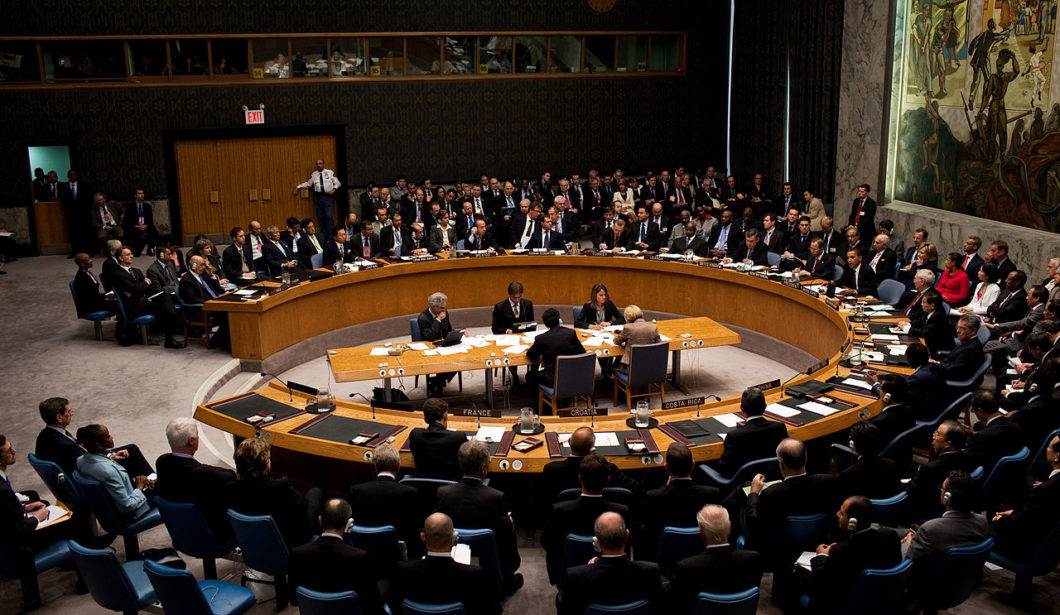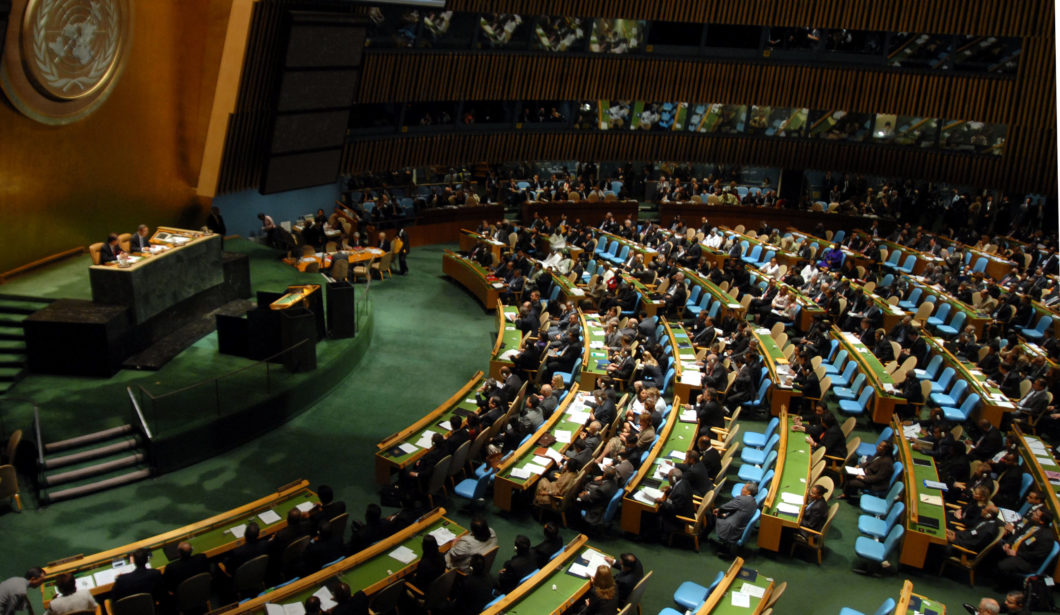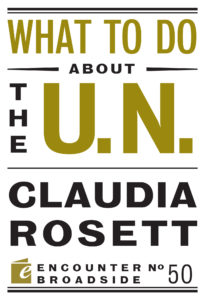Claudia Rosett sat down with ChangeUp Media’s Ben Weingarten on behalf of Encounter Books to discuss her new broadside What to Do About the U.N.
What follows is a full transcript of their discussion, slightly modified for clarity.
You can also listen to their interview in its entirety below. And to automatically receive Encounter Books Podcast interviews like these, be sure to subscribe to our podcast in the iTunes store.
Ben Weingarten: Claudia, there’s one quote in your book that permeates every element of it, and illustrates the problems of the U.N. from its very beginnings to today. And that is this quote: “On balance, the U.N. offers far more benefits at the margins to despotisms than it does to its democratic chief patrons.” Explain what you mean by that.
Claudia Rosett: Sure. The United Nations is not actually a democratic institution. It’s a collective. And, it’s a collective that nobody actually is able to call to account. It reports to itself. And the incentives are for the worst members, the rogue states, the really troublesome regimes around the world, to exploit its benefits as much as they possibly can. We saw this with Saddam Hussein under Oil-for-Food in Iraq years back. We have been seeing it with Iran. We even see it with North Korea. It’s a place that confers a legitimacy on tyrannies that they do not actually deserve — have not earned at home. And, basically they don’t just get funding from the world’s leading democracies, especially the United States, they also get legitimacy from it. We treat them well. North Korea has a seat at the U.N., and enjoys all the diplomatic privileges and immunities there that any democratic state does. So, the incentive is for the worst to try and make the most out of whatever they can at the U.N., which is one of the reasons we see them populating outfits like the U.N. Human Rights Council. And this has been the problem over and over at the U.N. for decades now.
“The incentive is for the worst to try and make the most out of whatever they can at the U.N.”
Ben Weingarten: To look at how the U.N. has evolved, it also pays to look at the U.N. from its beginnings. And you talk about conferring legitimacy on essentially illegitimate regimes, on the basis of what we value in the West. To that end, you mention in the book that Stalin’s Soviet Union was put on the U.N.’s Security Council at its inception. And that in many ways set the tone for the entire institution. In your view is that sort of the original sin of the U.N., so to speak?
Claudia Rosett: Yeah. Well, it represents the original sin, which is that membership is morally blind, okay. In theory it’s not. If you read the U.N. Charter, member states are admitted when they are committed to upholding, basically, individual dignity, freedom, peace loving, and so on. But that is not the way it works at all, in practice. In fact, if they actually honored the U.N. Charter, they would kick out a fair number of the current members. It’s a very funny, amorphous institution, where in some things…Again, the worst states are able to take advantage of some of its rules, and these special privileges that it gives them. And at the same time they’re not actually held to account. Again, one of the big problems here, is that the U.N. really isn’t accountable to anybody. It’s a vehicle for whoever is able to try to steer it. And the trouble is the greatest incentive to try to steer it belongs to the worst members of the U.N.
It's a place that confers a legitimacy on tyrannies that they do not actually deserve -- have not earned at home.
Ben Weingarten: One of the institutions within the U.N., that you mention, reflecting this is the U.N. Commission on Human Rights (UNCHR). Tell us a little bit about the UNCHR’s record.
Claudia Rosett: Yeah, this has been one of the great farcical committees for ages. The original committee, or commission, or council, was the Commission on Human Rights, which was set up in 1946 to try to weave together this international fabric of humanitarian law, and uphold human rights. This became this incredible magnet for every human rights abuser at the U.N. because what they were trying to do was not weave the fabric of human rights, but actually redefine the entire process. It was very Orwellian. It still is. Such that they themselves were cast as honoring human rights, even as they crushed, depressed, destroyed their own people. This became such a farce, by 2003 the council was just populated by, crammed with dictatorships, chaired by Gaddafi’s Libya, and focused obsessively, as happens at the U.N. over and over, on condemning Israel — specifically Israel. Others sort of got a pass.
“Human rights’ abusers at the U.N. were cast as honoring human rights, even as they crushed, depressed, destroyed their own people.”
This was finally dissolved, and what was supposed to be a reform in 2006, and the U.N. set up — it became so embarrassing, even the U.N. couldn’t let it keep going. It was dissolved and the U.N. then created the current Human Rights Council, which has become just as bad. Because, again, it’s a problem of incentives and the actual structure and rules of the U.N. Once again, Russia, China routinely get seats. So does Cuba. And it’s become, yet again, a council that is focused primarily on condemning Israel, and welcomes to seats countries that are known abusers of human rights. And you end up, once again, with something where it completely inverts the purpose. What’s supposed to be a council dedicated to defending human rights, which is a very important thing to do, becomes a place where, as on Animal Farm, nothing means what it actually is supposed to mean. And, they come away with, countries such as China, come away with this stamp of, “member of the Human Rights Council,” able to pronounce on other countries. And they’re not actually held to account but they can say we sit on the Human Rights Council. It’s extremely perverse, and it actually does a terrible disservice to real victims of human rights abuses.

.
Ben Weingarten: And as our listeners know of course, this is in keeping with the idea that government institutions and bills for example, are often inaptly named. They often reflect one thing and in practice illustrate another. One particular element of your book that I found interesting was your discussion of UNICEF, which people think of as doing good as a charitable institution. Tell us a little bit about the history of UNICEF.
The U.N. really isn't accountable to anybody. It's a vehicle for whoever is able to try to steer it. And the trouble is the greatest incentive to try to steer it belongs to the worst members of the U.N.
Claudia Rosett: Yeah, well look a little closer. When I give talks on the U.N., one of the questions I often start with is, “How many of you have collected coins when you were children for UNICEF?” It’s a Halloween thing, I did it. And it feels good. You think that you’re helping children around the world. Well if you look a little closer at the actual U.N. agency, UNICEF, it has a 36-member board which oversees its operations, makes the policy decisions – is its governing board. And among the members currently, one that just jumps out at me is Iran, which is distinguished for among other things, leading the world in juvenile executions. Do you really want them on the board of UNICEF, the U.N.’s children’s agency? [Or how about] China, which only rather recently abandoned its one-child policy, which entailed forced abortions and fines for parents who brought to term a second child without state permission. That’s very U.N.
I also, some years back was browsing the UNICEF site late at night, as one does, and came across on their Iran webpage a solicitation for donations to UNICEF in Gaza. And they were asking people in Iran to donate money to a bank that happened to be under U.N. and U.S. sanctions for its connections to Iran’s nuclear and missile programs. And I called up UNICEF and said, “What exactly is going on with this? Because you’re, what? You’re bankrolling children in Gaza, which is run by the terrorist group Hamas. And you’re soliciting money from Iran, which is the world’s leading state sponsor of terrorism according to the United States. And you’re running the donations through a bank that has been blacklisted, sanctioned, for its role in Iran’s proliferation programs? Is this a good idea?”
To which they said, “We don’t divulge confidential information. There is nothing to worry about. We’re not gonna share this with you.” Anyway, that’s the sort of thing, where at the U.N. because they have privileges and immunities, they can do it and you really can’t do anything about it. If any private group tried that, certainly a private group under U.S. jurisdiction, it is likely that somebody would’ve gone to prison. But the U.N. gets to do it and it’s virtually impossible to do anything about.
Anyway, you were asking me about UNICEF. That is an anecdote about the U.N. Children’s Agency. So, children are sort of the poster, literally, the poster children. But if you actually start looking at the operations, it is just full of dictatorships that abuse children and their parents horribly. And if you then dig further into its financial practices, they become sometimes profoundly troubling.
“If you actually start looking at the operations of UNICEF, it is just full of dictatorships that abuse children and their parents horribly.”
Ben Weingarten: Since you mentioned the financial practices, that provides a great segue into my next question which is, what is the “Cash For Kim” scandal?
Claudia Rosett: That was a lulu. That was in 2007. The U.N. has a lot of offices in North Korea, a totalitarian state run by the Kim dynasty dictatorship, since Stalin installed them in the 1940s. And the U.N. has a whole raft of operations and programs there, which are coordinated through its flagship agency, the U.N. Development Program, or UNDP. Well a whistle-blower came forward to the U.S. from the UNDP office in Pyongyang to say that, among other things, the UNDP was giving money to the North Korean government and was keeping counterfeit U.S. bank notes in its office safe, which is not a good promising sign. The U.S. mission began digging into this and discovered there was a whole raft of terrible things that had been going on. The U.N. Development Program was making use of its diplomatic immunities and privileges to import into North Korea dual-use items for use by the North Korean government, meaning items that could be re-purposed for weapons programs.
This is North Korea, which was working on nuclear weapons, which still is; which is testing ballistic missiles; which is a major problem and threat to South Korea, grow to Japan, to Asia and increasingly to the U.S. itself; which was just, we have some reason to believe, assassinated the half-brother of the current dictator, Kim Jong-un, using a weapon of mass destruction, VX nerve gas, in a Malaysian commercial airport. That’s North Korea. Anyway, the U.N. Development Program in 2007 was caught funneling money to the North Korean government, millions of dollars; allowing North Koreans to handle its bank account, which they apparently used to set up dummy accounts and transfer money through proliferation-related entities, in places like Macau and Singapore; and also was in fact, yes, keeping counterfeit U.S. hundred dollar bank notes in its office safe.
“It is outdated, it is dangerous, it gets ever bigger, it is utterly resistant to reform.”
While this was going on, North Korea was sitting on the Governing Board of the U.N. Development Program, which was flying North Korea’s representatives to New York, business class, to sit at its board meetings. That was a classic U.N. operation. This became known as the, “Cash for Kim” scandal.
When it first surfaced, then Secretary General Ban Ki-Moon said that there should be a worldwide audit, an independent audit, of all U.N. operations, to try and make sure that nothing more like this would happen. Within days, he backed off that promise. It never took place. They shut down the U.N. Development Program office for a little while in Pyongyang. Then they reopened it. Nobody at the U.N. was actually punished. And it hangs out there as this appalling window on the kind of problems that will arise with the U.N., especially when it becomes, as it too often does, complicit with the dictatorships, where it is trying to operate in the name or belief.
Ben Weingarten: So you lay out in this broadside, essentially a parade of horribles. You talk about the U.N. being an unaccountable, a corrupt institution; one that as we’ve discussed earlier, confers legitimacy upon illegitimate human rights abusing regimes. You even write that the U.N. closely resembles a neo-colonial empire. What benefits, if any, in your view does the U.N. provide to the United States, and the Western world more broadly?
What does the U.S. get out of this? Nothing that we couldn't get out of renting a gym somewhere in Kansas and inviting the diplomats to go there and talk.
Claudia Rosett: Very little. Look, there is a use for something, for a talking shop. It serves a purpose to have a place where envoys of the best of the worst can all sit down together and talk. But, to append to that, an institution with a budget that at this point, is somewhere well above $40 billion a year — a substantial, something like roughly a quarter of that coming from the United States’ taxpayers; and give it all sorts of reach, immunities, privileges around the world, that was the neo-colonial empire, to try and prescribe everything from how energy is used with the promise that they will regulate the climate of the planet…The U.N. can’t even keep track of its own money, and it should not be set free to try to regulate the energy of the world.

.
But, you have here something where the United States signed on, with the idea that we needed some outfit that could help to diffuse crises, that would help to preserve peace, that would try to avert another world war, another mass conflagration. And what you have at the U.N., at this point, is a place that actually allows problems to fester, sort of papers them over without solving them, take North Korea as an example, without solving them. And they get worse, and worse. And more and more promises are made by the U.N. that something will be done. Take Syria, as another example. Take the problems now arising with Russia, which has a veto at the U.N. Security Council, so nothing really gets addressed. And you now have an institution that’s actually helping…It’s sort of like a pressure cooker with a lid. It sounds like, “Oh, something is getting done.” Actually, there are plenty of reasons to believe that the U.N. gets in the way.
It is more an institution that tries to offer central planning around the planet, which has been a disaster. Which has sort of defaulted to promising to fix the climate of the Earth, which is baloney. And, as far as actually preserving peace, the U.N. is not doing it. So what does the U.S. get out of this? Nothing that we couldn’t get out of renting a gym somewhere in Kansas and inviting the diplomats to go there and talk.
And my argument is that the rest of it, we really need to take a look, and say, “What is the opportunity cost of maintaining this huge institution, which has been growing and growing, and has defied for decades any real effort at reform? And is there not some better way?” Because what we get out of it…Actually I should add, what we get out of it in some cases is less than nothing. It becomes a magnet for anti-American groups, behavior.
“What the U.N. provides is a clubhouse, where that kind of angle on the U.S., anti-Americanism, is sort of brought to the fore.”
Let me give you a concrete example of that. The second largest voting bloc in the General Assembly is the Non-Aligned Movement, 120 members. That’s 119 member states, plus the Palestinian Authority. There are 193 member states at the U.N., so this is a large portion of the membership. What countries have chaired this Non-Aligned Movement? Well, right now it’s Venezuela, which is a basket case. Before that, it was Iran. Before that, it was Egypt, Cuba. It’s been this series of countries that are in no way models of what the world should be following or doing. And when you had Iran chairing it, this was not a group that was encouraged to be friendly to the United States — the very opposite. Likewise with Venezuela, now in charge. And what the U.N. provides is a clubhouse, where that kind of angle on the U.S., anti-Americanism, is sort of brought to the fore. Countries can get together and in very plush surroundings, thumbing their nose at the United States, while enjoying the substantial amenities of a very nice, recently revamped, for a cost of more than $2 billion U.N. headquarters in New York, plus its offices around the world, thumb their noses at the United States and pursue initiatives that very often actually undermine democratic values, America and its allies. What we get out of it is basically a chance to talk, and what we get back are some very bad things.
Ben Weingarten: Your broadside comes out at a very opportune time, in that you have a U.S. presidential administration that is similarly skeptical of the institution and espouses a view that a globalist institution like this does not necessarily serve America’s national interests. It’s not necessarily in our compelling national interest to engage in an institution that essentially serves to legitimize our enemies, and also subjects us to, essentially, a global government-esque or pseudo-government regime. Given that that’s the case, what would you like to see the Trump administration do with respect to the United Nations? And what are your initial impressions of the Ambassador to the U.N., Nikki Haley’s, initial actions at the U.N.?
Claudia Rosett: The Trump administration should bypass the U.N. as far as possible. What I’m strongly urging in this broadside is that it really is time to look at how could we leave the U.N. behind, supplant it, replace it. And somebody needs to do a serious study of this. People call for it periodically. I have. If you ask “How do we actually unwind the U.S.? How could we unwind the US from the immensely complex net of commitments to the U.N.?” That’s a question that I really haven’t seen addressed by people who understand how these things work. And I think it needs to be. Let’s ask the question: “How could we do it?” And the case for doing it, I think, is extremely strong. That’s what I’ve tried to argue in this broadside.
What the Trump administration could do is, don’t default to the U.N. as the place for international crisis. We’ve just seen, North Korea is right now testing ballistic missiles, and creating yet more trouble, and Ambassador Haley came out and gave a very strong statement on North Korea. I applaud her for it. But we have been watching the U.N. do this for years. It’s now 11 years since the U.N. began imposing sanctions on North Korea for its missile and nuclear programs, and North Korea at this point has conducted five nuclear tests, scores of ballistic missile tests, and carries right on. It’s the ritual: The U.N. condemns them, North Korea proceeds. The U.N. puts on sanctions, North Korea proceeds.
The Trump administration should bypass the U.N. as far as possible.
So Ambassador Haley is doing very well I think with what she’s got to work with. I think she’s also been terrific on the question of support for Israel, of things that President Obama was turning into a real mess at the U.N. But there’s a limit to how far any of this can be taken at the U.N. Anything that gets done at the U.N. Security Council has to have the assent of Russia and China, which gives you a very limited area in which to maneuver. And what the Trump administration needs to be doing is looking for ways to work around the U.N ; to make coalitions that don’t rely on the U.N.; to actually ask not, what is the structure of the U.N. dating back to the days of Stalin and Truman in 1945, but what are the needs of the 21st century? What is it that really is in America’s interest? And how do we deal with the rapidly rising threats that come after eight years, in which President Obama basically deferred and defaulted to the United Nations over and over, the result being growing threats on every side: From China, from Russia, from Iran, from North Korea, and countries that are now trying to figure out how to maneuver, because U.S. leadership really fell by the wayside for some years there.
So, for Ambassador Haley, it will be…It’s difficult to try to dispense with the U.N. while working within the U.N. And I think that she’s been walking a difficult line so far, very well. But what the Trump administration, more broadly, should do, I hope they will, we have yet to see, is try to go around the U.N. Is ask, how can we do this without the U.N.? Is ask not, what is it we owe to the U.N., but what is it we owe to the United States?
And the way that the private sector could help them, the pundits, the commentators, the analysts, is it would be of great benefit to have some serious attention given to the question of how do we supplant the U.N.? It is outdated, it is dangerous, it gets ever bigger, it is utterly resistant to reform. It’s been tried over and over again. Is there not some way to move beyond this and find something that relies more on actual U.S. interests, on actual competition. What you hear over and over about the U.N., is it may be imperfect but it’s all we’ve got. And the point I am trying to make here, and that I hope the Trump administration will understand and do something with, is if the U.N. is all we’ve got, it is way past time to come up with something else.

